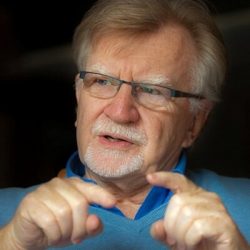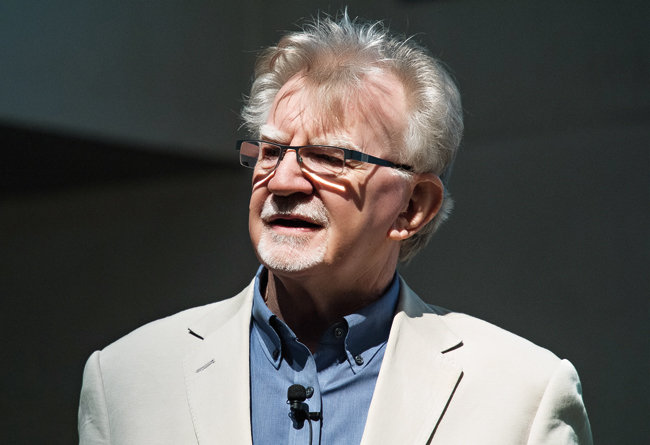
Wiki / RichardBarrett
Inhaltsverzeichnis: (verbergen)

Richard Barrett (*1945) |
|
Only by focusing on the greater good can we create the conditions which give us the opportunity to find our greatest personal success. |
Persönliche Bekenntnisse
Personal avowals
Appeal
Reference: Rajendra S. Sisodia, Ph.D., Indian US American professor of marketing, Bentley University, co-founder and chairman of the Conscious Capitalism Institute, founding member of the Conscious Capitalism movement, Jagdish N. Sheth, Ph.D. (*1938) Burmese-US American Charles H. Kellstadt professor of marketing, Goizueta Business School, Emory University, David B. Wolfe, US American customer behavior expert, author, Firms of Endearment. How World-Class Companies Profit from Passion and Purpose, Pearson Prentice Hall, 1st edition 10. February 2007
1. Instincts; 2. Subconscious beliefs; 3. Conscious beliefs; 4. Values; 5. Intuition

Democracy Index: The top five democratic countries are Norway, Sweden, Iceland, Denmark, and New Zealand.
| See also: ► Leadership |
Persönliche Bekenntnisse
Personal avowals
| |||||||||||||||||||||||||||||||||||||||||||||||||||||||
| Source: ► Video dialogue with Richard Barrett, FRSA (*1945) British social commentator, speaker, author on the evolution of leadership and human values in business and society, Evolutionary Coaching, the Power of Trust, and High Trust Cultures, presented by the "Barrett Values Centre", host Michelle Clarke, US American social entrepreneur, executive coach, YouTube film, 48:26 minutes duration, posted 15. April 2014 | |||
| See also: ► Maturity and ► Evolution of consciousness | |||
| ||||||||||||||||||||||||||||||||||||||||||||||||||||||||||||||||||||||||||||
| Source: ► Richard Barrett, FRSA (*1945) British social commentator, speaker, author on the evolution of leadership and human values in business and society, The Seven Levels of Personal Consciousness, PDF, first presented in "Business & Economics", S. 248-252, 2006 |
| See also: ► Step models |
| |||||||||||||||||||||||||||||||||||||||||||||||||||||||||||
| Sources featuring Richard Barrett, FRSA (*1945) British social commentator, speaker, author on the evolution of leadership and human values in business and society ► Video presentation The Evoluotion of Consciousness: Next Steps, 2012 BVC International Conference, part 1 of 2, presented by the "Barrett Values Centre", YouTube film, minute 5:29, 20:21 and 28:23 and 36:13 minutes duration, posted 17. December 2012 ► Video presentation A Compass for Navigating Cultural Transformations, presented at the "Building Capacity for Sustainable Transformations" conference, sponsored by the Italian company Asterys, Rome, 7. June 2012, YouTube film, minute 31:41, 48:33 minutes duration, posted 29. October | |||
| See also: ► Evolution of consciousness and ► Politics | |||
| ||||||||||||||||||||||||||||||||||||||||||||||||||||||||||||||||||||||||
|
| |||||||||||||||||||||||||
| Video sources featuring with Richard Barrett, FRSA (*1945) British social commentator, speaker, author on the evolution of leadership and human values in business and society ► [*]Removed audio interview with Richard Barrett, FRSA (*1945) British social commentator, speaker, author on the evolution of leadership and human values in business and society, Love, Fear and the Destiny of Nations – The Future of Western Civilisation, No. 23, MP3, pre- sented by Dr. Nicholoas Beecroft, British consultant psychiatrist, YouTube film, 1:27:17 duration, posted 11. April 2012 ► Vimeo video interview Measuring Conscious Cultures and Conscious Leadership, presented by 4th Annual International Conference on Conscious Capitalism; Conscious Capitalism: Building a Flourishing Business on Love and Care, Bentley University, Waltham, Massachusetts, 22.-23. May 2012, 31:55 minutes duration, posted 22. June 2012 ♦◊♦ Ken Wilber's AQAL model: Leaders need to walk the talk, live authentically. When the values of the leaders change their behavior changes alike which restructures the value system of the organisation and subsequently the behaviors of the whole organisation. Minute 25:21 ♦◊♦ High cultural entropy in organisations/nations (41+%) ensues in very low engagement. When they are bigger than 51% fallouts of organisations/governments are imminent. (See Iceland, France, United States) ♦◊♦ 6. September 2008 – Iceland had 54% entropy due to issues of leadership (government). 2 weeks later the banks in Iceland went bankrupt. Re-elections voted out the existing government. Former Icelandic prime minister Geir Haarde was put on trial of charges of negligence over the 2008 financial crisis in March 2012. Minute 21:29 ♦◊♦ November 2009 – Latvia had cultural entropy of 52%. A few months later government changed.1 Minute 29:33 ♦◊♦ 1. May 2012 – France had the highest percentage of cultural entropy of all 15 assessed nations. President Sarkozy lost the elections on May 15, 2012. People are leaving France. Minute 30:00 ♦◊♦ Staggering rates of cultural entropy were found in the United States year after year: 52% (2009), 54% (2010), 56% (2011). The most severe issue of conflict is the growing social inequality gap.2 Minute 31:34 ► Video presentation Barrett Seven Levels and CTT Intro, presented by valuescentre, YouTube film, 7:06 minutes duration, posted 25. July 2019 |
| Literature by Richard Barrett, FRSA (*1945) British social commentator, speaker, author on the evolution of leadership and human values in business and society ► Love, Fear and the Destiny of Nations. The Impact of the Evolution of Human Consciousness on World Affairs, Fulfilling Books, 4. May 2012 Based on the Barrett Model, developed from Abraham Maslow's (1908-1970) Hierarchy of needs model, 1998 ► Liberating the Corporate Soul. Building a Visionary Organization, Butterworth-Heinemann, 1st edition 5. November 1998 Note: Three mantras displayed |
| See also: ► Transparency and ► Politics ► Spiral Dynamics Consciousness model – according to Ken Wilber's terminology / color scheme |
| ||||||||||||||||||||||||||||||||||||||||||||||||||||||||||||||||||||||||||||||||||||
| Source: ► Richard Barrett, FRSA (*1945) British social commentator, speaker, author on the evolution of leadership and human values in business and society, Love, Fear and the Destiny of Nations. The Impact of the Evolution of Human Consciousness on World Affairs, Fulfilling Books, 4. May 2012 Based on the Barrett Model, developed from Abraham Maslow's Hierarchy of Needs, 1998 |
| See also: ► Step models |
| |||||||||||||||||||||||||||||||||||||||||||||||||||||||||||||||||||||||
| Source: ► Richard Barrett, FRSA (*1945) British social commentator, speaker, author on the evolution of leadership and human values in business and society Barrett Models –––– Inspired by Abraham Maslow's Hierarchy of Needs, 1998 |
|
| [*] Source: ► Removed audio interview with Richard Barrett, FRSA (*1945) British social commentator, speaker, author on the evolution of leadership and human values in business and society, Love, Fear and the Destiny of Nations – The Future of Western Civilisation, No. 23, MP3, presented by Dr. Nicholoas Beecroft, British consultant psychiatrist, YouTube film, minute 11:11, 1:27:17 duration, posted 11. April 2012 |
| See also: ► Culture and ► Politics and ► Consciousness and ► Dignity and ► Community |
| |||||||||||||||||||||||||
| ||||||||||||||||||||||
| References: ► Culture & Vision, presented by Barrett Values Centre |
| See also: ► Vision |
|
Social justice generally refers to the idea of creating a society or institution that is based on the principles of equa- lity and solidarity, that understands and values human rights, and that recognizes the dignity of every human being. The term and modern concept of "social justice" was coined by the Jesuit Luigi Taparelli in 1840 based on the teachings of St. Thomas Aquinas and given further exposure in 1848 by Antonio Rosmini-Serbati. The idea was elaborated by the moral theologian John A. Ryan, who initiated the concept of a living wage. Father Coughlin also used the term in his publications in the 1930s and the 1940s. It is a part of Catholic social teaching, Social Gospel from Episcopalians and is one of the Four Pillars of the Green Party upheld by green parties worldwide. Social justice as a secular concept, distinct from religious teachings, emerged mainly in the late twentieth century, influenced primarily by philosopher John Rawls. Some tenets of social justice have been adopted by those on the left of the political spectrum. According to Dr. Kent Van Til, the view that wealth has been taken from the poor by the rich implies that the redistribution of that wealth is more a matter of restitution than of theft. Source: ► en.Wikipedia entry Christian views on poverty and wealth – Social justice [status 2013] |
| ||||||||||||||||||||||||||||||||||||||||||||||||||
| See also: ► Justice and ► Incomplete timetable of paradigmal shifts |
| ||||||||||||
Latvia has 2.3 million inhabitants. In 2008 Latvia was in a worse situation financially, culturally and energetically than Iceland. The Barrett Values Centre procured a "Latvian National Values Assessment" which resulted in the governmental project Latvia 2030, a value-based long-term development plan.3
The native Latvians and the Russian immigrants – two factions with largely differing belief systems – did not get along with each other. Further value assessment found that the desired cultural values of both factions were almost exactly the same.
Latvia's promising new narrative is: "Our values matter." – "Let's create values."
| Sources: Video interviews featuring the Barrett Values Centre ► Phil Clothier, British CEO of the Barrett Values Centre: Phil Clothier – 'Consciousness in Business', presented by the British Conscious.TV, host Iain McNay, British chairman of the independent label Cherry Red Records, YouTube film, minute 41:36-46:59, 53:59 minutes duration, posted 11. February 2011 ► Phil Clothier, British CEO of the Barrett Values Centre: National Assessments and Banking and Latvia, YouTube film, 5:31 minutes duration, posted by BarrettValuesCentre 28. April 2010 ► Richard Barrett, FRSA (*1945) British social commentator, speaker, author on the evolution of leadership and human values in business and society, Beliefs vs Values Decision Making, YouTube film, 1:59 minutes duration, posted by BarrettValuesCentre 12. July 2010 |
| See also: ► Decision and ► Seventeen stories in life and ► Stories ⇔ narratives |
Links zum Thema Richard BarrettLiteraturLiterature (engl.)
The critical factors of successfully building a visionary organization, to liberate the corporate soul/mission are:
Externe Weblinks
External web links (engl.)
Audio- und VideolinksAudio and video links (engl.) – Richard Barrett
New emerging business paradigm
Evolution of Individual Consciousness: 1. Surviving ♦ 2. Conforming ♦ 3. Differentiating ♦ 4. Individuating ♦ 5. Self Actualizing ♦ 6. Integrating ♦ 7. Serving Minute 20:21
Linkless media offering
|
Englisch Wiki
Hawkins
1 Deleted video interview with Phil Clothier, British CEO of Barrett Values Centre, National Assessments and Banking and Latvia, YouTube film, 5:31 minutes duration, posted by BarrettValuesCentre 7. January 2010
Process and results of the Latvian National Values Assessment resulting in a Latvia 2030 development plan ⇑
2 Video presentation US National Values Assessment 2010, deleted YouTube film, 7:47 minutes duration, posted by BarrettValuesCentre 28. June 2010 ⇑
3 Latvia's Sustainable Development Strategy 2030, presented by the UNESCO, undated ⇑